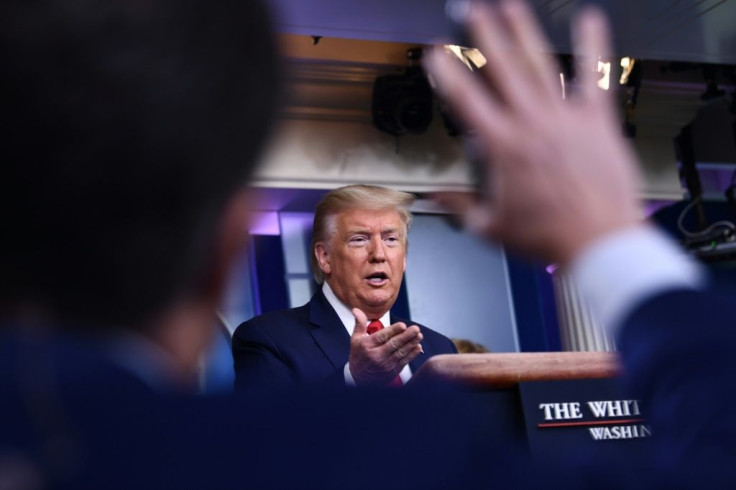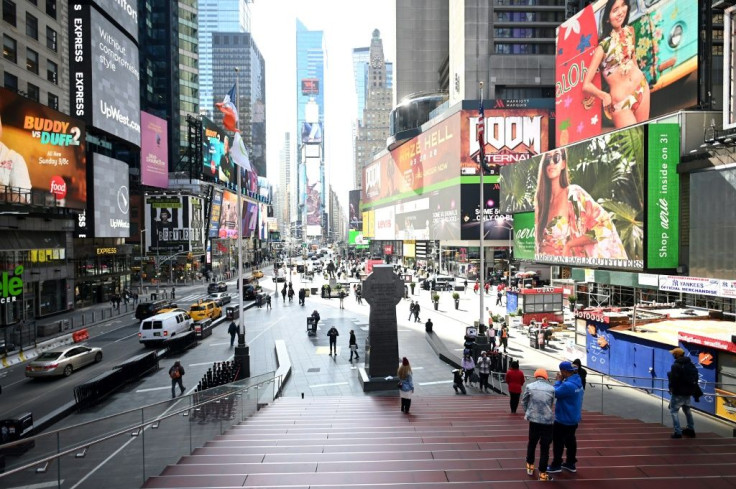Coronavirus USA Update: US Death Toll Hits 207; 13,783 Confirmed Cases

KEY POINTS
- Worldometer reported 13,783 total confirmed COVID-19 cases in the U.S. and 207 deaths as of Thursday
- Healthcare professionals publicly fret about their dwindling supplies of respirators and facemasks
- The U.S. is now the sixth most COVID-19 infected country in the world, it stood in eighth on Monday
The United States saw more than 3,500 confirmed COVID-19 cases in a 24-hour period as of late Thursday afternoon -- another new record spike -- even as harried doctors and politicians are again warning the pandemic might overwhelm hospitals around the country, perhaps as early as in the next two weeks.
Throughout the U.S., there were 11,274 confirmed cases of COVID-19 as of 4:43 p.m. ET Thursday and 157 deaths, according to data from the Center for Systems Science and Engineering (CSSE) at Johns Hopkins University. The total for Thursday was 45% higher than that for Wednesday.
One hour later, CSSE updated its toll to 13,159 cases in the U.S. and 170 deaths. It also listed 242,191 cases worldwide.
By comparison, as of Wednesday 4:53 p.m. ET, there were 7,769 confirmed COVID-19 cases in the U.S. and 118 deaths, said CSSE. These totals compare to the 5,894 cases and 97 deaths recorded at about the same time Tuesday.
On the other hand, real-time data tracking website Worldometer reported 13,783 total confirmed COVID-19 cases in the U.S. and 207 deaths as of Thursday, 23:05 GMT.
Worldometer identified 4,524 new cases on Thursday and 57 deaths. The U.S. had the fifth most number of new deaths worldwide on Thursday based on Worldometer data. Italy topped the death list with 3,405 deaths followed by China with 3,245. For the first time, China reported no new domestic cases Thursday.
Doctors and other healthcare professionals publicly fret about their steadily dwindling supplies of respirators and facemasks. New York City mayor Bill de Blasio warned the city was only three weeks away from running out of medical supplies. He also said the city needs 30,000 ventilators.
An announcement by the U.S. Centers for Disease Control and Prevention (CDC) healthcare frontliners can reuse their masks, or use bandanas and scarves as a last resort, inflamed fears and anger the critical shortage of masks is getting worse.

The shortage of respirators and facemasks rages nationwide. The Phoebe Putney Health System in southwest Georgia used six months' worth of supplies in less than a week, said Scott Steiner, the hospital group's president and CEO.
"We've got a three-day supply of N95 masks on hand," said Steiner to CNN. "In order to preserve these, and get them to last longer, we've got a team of people sewing masks together."
He showed a "prototype" made of surgical sheeting that can be placed over a real N95 mask.
"This is what we're going to have to do because we don't know when the next shipment is coming," Steiner pointed out.
Ventilators, which force life-saving oxygen into the crippled lungs of infected people, is also in short supply with only 60,000 available in the U.S. Health experts estimate the U.S. will need more than 100,000 ventilators to meet the challenges of a mild national pandemic. New York State plans to purchase 500 ventilators costing as much as $20,000 to $40,000 each.
Ventilator manufacturer Hamilton Medical Inc. said it's received hundreds of orders and requests within the past few weeks.
"It is more than we can currently provide," said Kathrin Elsner, team leader of MarCom Ventilators at Hamilton Medical.
This looming fiasco is again shining a light on the revelation the Trump administration might have prevented the COVID-19 response disaster if it hadn't defunded Obama-era epidemic prevention activities undertaken by the CDC in 39 countries, including China. The program was shut down in 2018 because of lack of funds.
On the COVID-19 front around the United States on Thursday:
- Senate Majority Leader Mitch McConnell, R-KY, vowed Senate approval of the $1 trillion economic stimulus bill at “warp” speed, which in reality means an approval by late next week at the earliest.
- Bayer said it's donating three million tablets of its antimalarial drug Resochin (generic name: chloroquine phosphate) to the U.S. government. Originally indicated for the prevention and treatment of malaria, chloroquine also appears to have “broad spectrum antiviral properties” and effects on the body’s immune response. Trump earlier said chloroquine is a "game changer" that can cure COVID-19.
- Oklahoma announced the state's first COVID-19 death. The Oklahoma State Department of Health said the fatality is a man in his 50s from Tulsa County. There are 44 cases of coronavirus in state.
- American Airlines will ground nearly half of its fleet and canceling 55,000 flights in April. It also expects “demand to fall even more before it gets better."
- Trump said he's considering “repercussions” for China's handling of the COVID-19 crisis after days of placing the blame for the virus on the country and calling it the "China virus."
- Domino's Pizza will hire up to 10,000 people as Americans are forced to resort to takeout or delivery amid movement restrictions imposed by state governments.
- The State Department raised its travel advisory worldwide to Level 4: Do Not Travel -- the highest level -- in the face of the COVID-19pandemic.
- New York Gov. Andrew Cuomo asserted "there is no quarantine plan for New York City" because of the raging COVID-19 pandemic. He also announced announced a 90-day mortgage relief for homeowners across the state.
© Copyright IBTimes 2024. All rights reserved.





















